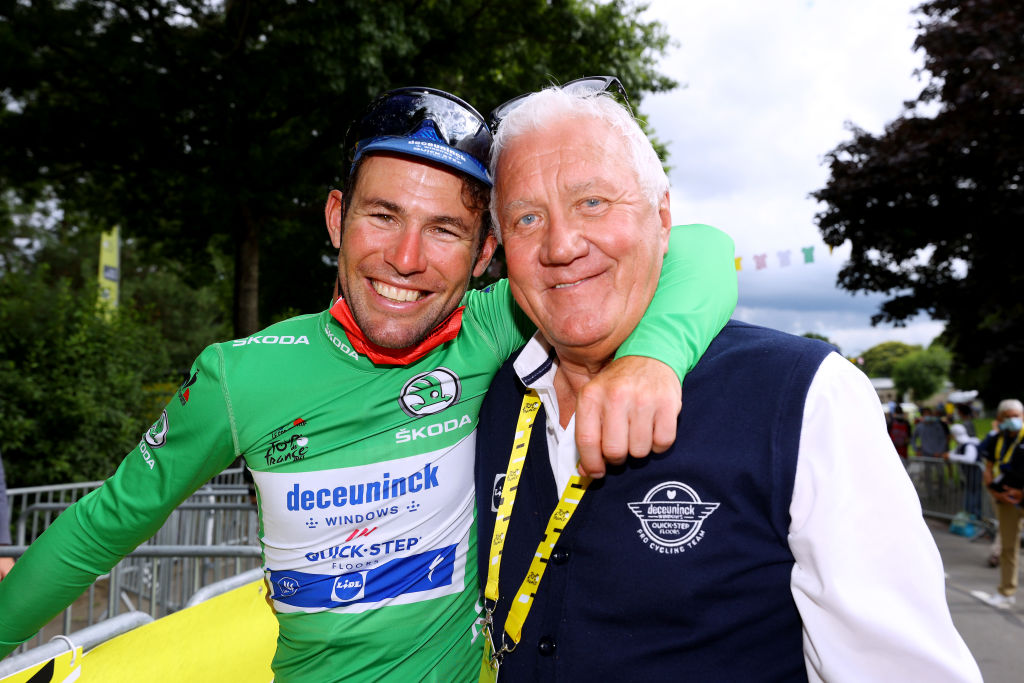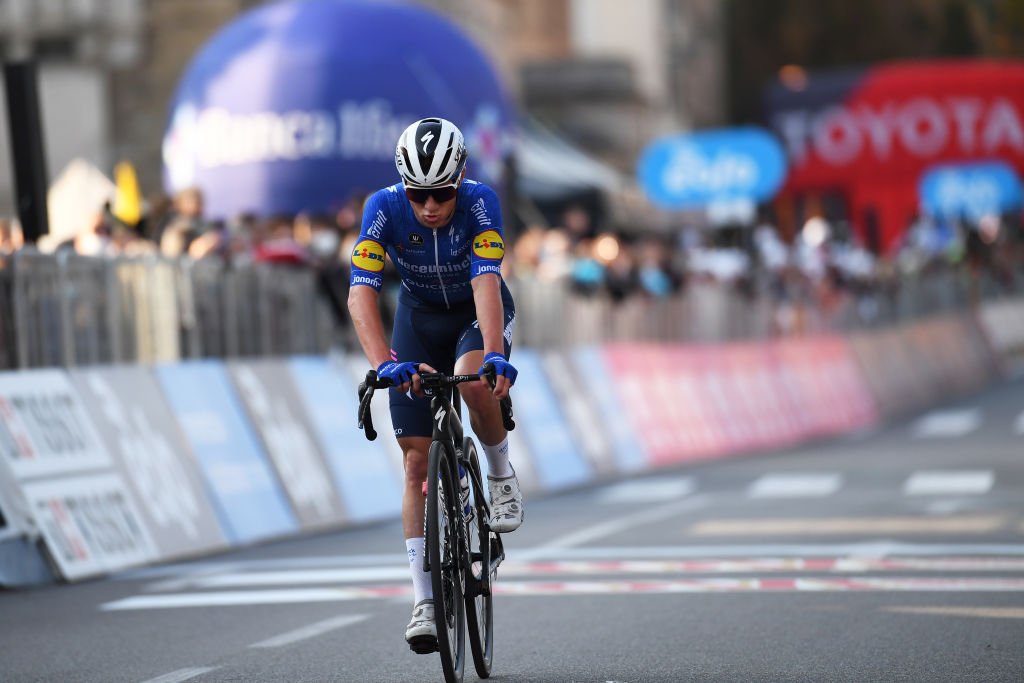Lefevere: It's too early to say if Cavendish will ride the Tour de France
QuickStep-AlphaVinyl manager on Evenepoel, the Classics and leaving Twitter

Long-standing QuickStep-AlphaVinyl team manager Patrick Lefevere has said it is too early to decide whether Mark Cavendish will ride the 2022 Tour de France, although his belief that re-signing the Briton in 2021 was a masterstroke remains undiminished.
“In my opinion it’s one of the best moves I ever did,” Lefevere told a small group of reporters during the team’s media day in Calpe this week.
“You know the story of Mark and me, he left the team [at the end of 2015] for budget reasons and then after the misery of his last few months at Bahrain [in 2020, when Cavendish’s career appeared to be drawing to a low-key end] he broke my heart.”
Cue Cavendish’s return to QuickStep for 2021, and his renaissance in the Tour de France. “Everybody said you are lucky,” Lefevere said, “but I don’t think I was. I took the risk, the team immediately accepted him and he worked very hard. And we saw the result.”
Lefevere added, however, that a decision on Cavendish's return to the Tour de France in 2022 will have to wait for now. His justification for that seems largely to be based on how the sprinter’s participation in 2021 was in no way clear prior to the event either.
“That’s a very interesting question, everybody asks me that question, especially the press,” Lefevere said.
“But on the other hand he was not even in the team for the Tour of Belgium, not even the Tour de France. Then with the history of Sam Bennett he took his place, he took his chance, he won. But it’s too early and too easy to predict today what will happen.”
Get The Leadout Newsletter
The latest race content, interviews, features, reviews and expert buying guides, direct to your inbox!
Lefevere did indicate that cold statistical data would not play a part in the decision-making process, something which he insisted was far from being out of the ordinary for him. Witness his re-signing of Cavendish, when he opted to let his emotions about the sprinter’s plight win the day over any hard-headed business decision. Or as he puts it: “I never work with numbers, I work with people.”
Evenepoel

One certainty regarding QuickStep-AlphaVinyl’s star names and Grand Tours for 2022, though, is that Remco Evenepoel will make his debut in the Vuelta a España next September. After Evenepoel’s rollercoaster Giro d’Italia last year, Lefevere recognised that the season will offer up more clues about the young Belgian star’s potential in three-week stage races.
“He’s so good, he can win one-day races, week-long races and the question is whether he can win Grand Tours. Some people say that [Tadej] Pogačar had already won two Tours at the same age, but Pogačar is Pogačar and Remco is Remco.”
As for why Evenepoel has chosen the Spanish Grand Tour over the Giro or Tour, Lefevere said: “It’s his choice. We’ll do a normal season with him, including Tirreno, the Walloon Classics, a break after Romandie, then Dauphiné or Suisse, altitude training during the Tour and then onto the Vuelta.
“We’ll see what happens, and then afterwards you can ask me some questions. Because this is the nice thing, we don’t have that crystal ball, we don’t see the future. I’m not Madame Soleil.”
Lefevere may be no fortune-teller, then, nor yet base his strategy purely on performance data. But there’s no arguing with the fact that his team’s 65 wins in 2021, 25 of them at WorldTour level, made QuickStep the most prolifically successful squad of last season. They also won the WorldTour team competition for a third straight year.
Exactly where and whether QuickStep-AlphaVinyl may reap similarly high levels of success in 2021 remains to be seen. But if Evenepoel’s stage racing career in 2022 and Cavendish’s participation – or not – in the Tour will likely dominate the QuickStep-AlphaVinyl narrative in the summer, the Flemish squad’s focus on their trademark races, the spring Classics remains undimmed, too.
Victories for Kasper Asgreen in the Tour of Flanders and E3 Harelbeke, along with Julian Alaphilippe’s win in Flèche Wallonne, were just three of the team’s highlights of the first half of the season and Lefevere maintained that his team’s near-legendary strength in depth when it comes to one-day racing remains intact.
“We are definitely not weaker, and maybe even stronger in the Walloon Classics as Julian won’t be doing Flanders. He tried it twice, and crashed when he was making the race, so he’s going back to where he started [in the Ardennes Classics].
“It’s true he didn’t win 10 races in 2021, but then five years ago there was no Pogačar, no Van der Poel, no Wout van Aert. The competition is much stronger. And even so, in the big moments of a race, he’s there… If you see what did he on that first stage in the Tour or in the Worlds, when everybody knew he was going to attack and get away. But he did it all the same.”
With such a high win rate, it’s hard to find downsides to QuickStep’s past season, but one of the few came with Evenepoel’s abandon of the Giro d’Italia, which in turn has led to much questioning of the wisdom of putting Evenepoel in the Giro in the first place. Lefevere’s answer to that is simple: it’s very easy to be wise after the event or when viewing a race from the side lines, and from the team’s point of view it’s much more sensible to look to the future.
“On the Monday in front of my TV, I win every race I watch. And if I’m in the football stands I’m the best player in the world. It’s too easy,” Lefevere commented.
“It’s like when you are in the car and you go too fast and then you see the wall and you brake, but you cannot stop. That’s a little bit what happened to us. He had a very bad day on the Strade Bianche stage, and then everybody said ah ‘Remco cannot handle it.’
“But on the day of the crashes, [in the Giro’s third week after which Evenepoel abandoned] some of the best descenders in the world like Vincenzo Nibali were already on the ground and Remco was hit from behind by that Spanish rider at 60 kilometres per hour. Learning is the most important thing, he had a normal winter and let’s pray that they stop cancelling races because he had to change his program already from Argentina to another race.”
Lefevere himself has gone through some changes since last spring. He is well-known for being outspoken and giving as good as he gets when faced with opposing opinions, but last autumn even Lefevere decided it was time to step out of the virtual boxing ring of social media.
Lefevere said that the diminishing readership of the written press in Belgium meant he had tried to use Twitter and Facebook as a more direct means of communication with the public. But he had found that the risks of being misunderstood or having his words lost in translation or taken out of context were greater than he expected.
“They [the attacks he faced on social media] are not pleasant but maybe sometimes I have to shut up because it’s very clear Flemish is not English,” he said.
“But if some people are too lazy to translate what I really said, they don’t exasperate me. If look at these people with zero followers [on Twitter], or 10 or 20, and they attack me like I’m a criminal, they hope I will reply because then they have 100 followers.
“So at one point [last autumn] I said to myself ‘stupid asshole, you are 66, don’t be embarrassed by Twitter, you don’t need Twitter.’ So I stopped. And I didn’t miss it for one second.”
Alasdair Fotheringham has been reporting on cycling since 1991. He has covered every Tour de France since 1992 bar one, as well as numerous other bike races of all shapes and sizes, ranging from the Olympic Games in 2008 to the now sadly defunct Subida a Urkiola hill climb in Spain. As well as working for Cyclingnews, he has also written for The Independent, The Guardian, ProCycling, The Express and Reuters.
